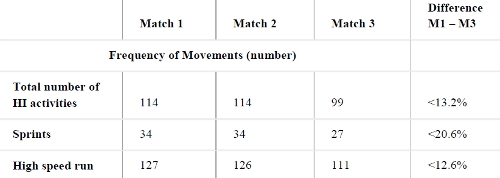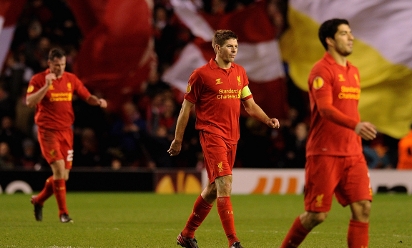Analysis: Fixture pattern benefits LFC
In her first column for our new Talking Reds feature, sports writer Kate Cohen takes a statistical look at how Europa League participation – or lack of it – can affect a league campaign...
.jpg)
With Liverpool not competing in the Europa League next season, let's look at the facts: is this a positive or a negative?
The Thursday-Sunday conundrum
Perhaps the main detrimental factor to playing in the Europa League is the Thursday-Sunday fixture pattern. With Champions League fixtures taking place on Tuesday and Wednesday nights, Europa League fixtures are played on Thursday night - where UEFA can avoid their two major competitions clashing, creating a television rights problem (aka a financial problem). Similarly, the Premier League is reluctant to schedule fixtures on a Monday, meaning teams competing in the Europa League play on Thursday in Europe and then back up to play on Sunday in the Premier League.
Whilst this doesn't sound too bad, the statistics suggest otherwise - strongly pointing towards the idea that Europa League involvement is detrimental to league success.
In the season that has just passed, Liverpool ended the Premier League season in 7th place, on 61 points. However, by comparing points per game and goals for/against per game when Liverpool were competing in the Europa League with after they were eliminated, the statistics are compelling.

Had Liverpool maintained their 2.00 points/game average over the course of the season, they would have ended the season with 76 points (3rd place).
Whilst these statistics do not take into account the signings of Daniel Sturridge and Philippe Coutinho and the small sample size - only 11 league games played after elimination - a clearer picture can be gauged by looking at the individual fixtures which occurred after a Europa League fixture.
Liverpool played 12 games in the Europa League last season. It took until the 10th attempt for Liverpool to win a league match following a European fixture - the 3-2 win away to West Ham.
The statistics from Liverpool's last participation in the competition similarly suggest that Europa League participation has a negative impact on Premier League results - or rather, not competing in the Europa League has a positive impact on Premier League results.
The 2010-11 statistics are as follows:

If Liverpool had maintained 'post-Europa League' form for the entirety of the 2010-11 season, they would have ended on 68 points, equal with Arsenal, but ahead on goal difference - meaning, they would have qualified for the Champions League.
Again, this doesn't take into account certain factors (such as Roy Hodgson leaving); however, it suggests that the Thursday-Sunday fixture pattern is detrimental to league results.
It's not just a feeling
Whilst these two tables have flaws, like all short-term results comparisons, it has been proven that Europa League participation is negative to league results and physical performance.
Raymond Verheijen, a football conditioning expert who, like the Europa League, divides opinions, published a study looking at the impact of less recovery time on results.
His study looked at 27,002 games from seven countries. Verheijen concluded that teams who had just two days' recovery (ie playing in the Europa League with its Thursday-Sunday fixture pattern) were 39 per cent less likely to win at home and 42 per cent away from home when they came up against an opponent who had at least three days' recovery.
.jpg)
Verheijen suggested that this was due to fatigue (caused by a lack of recovery time). His study also found that, after only two days' recovery, a team would:
- Score 70 per cent less goals after the 60-minute mark; and,
- Concede 75 per cent more goals after the 60-minute mark.
Was it any surprise that it took Liverpool until the 10th March (their 29th Premier League fixture) to record a come-from-behind win, over Tottenham?
Was it a surprise that Liverpool had been knocked out of the Europa League and had six days to recover prior to that match?
Was it a surprise that Tottenham had played a Thursday night Europa League fixture against Inter Milan, leaving them just two days to recover?
Maybe we are onto something...
Does it affect performance?
Well, according to Odetoyinbo, Wooster and Lane (2008), yes. The study, looking at the impact of playing successive matches with limited recovery time concluded that, whilst the distance covered only changed slightly, there was a dramatic drop in high intensity movements by the third game.
Distances covered:

Frequency:

Duration:

So, by the third match, a player couldn't perform at the same intensity as the first match. Perhaps most alarmingly from a Liverpool perspective, considering the focus on possession football, a player covered 27.3 per cent less distance with high intensity when their team had possession.
So, if these high intensity movements are the difference between winning and losing, does playing in the Europa League reduce the chances of winning matches in the Premier League? The statistics suggest so.
Rotation
One of the obvious means to reducing fatigue caused by playing a Thursday-Sunday fixture pattern is to rotate. This is seen as an opportunity for young or fringe players to test themselves. This was the case for Liverpool, with Brendan Rodgers using a total of 28 players in the Europa League in 2012-13.
Conclusion
This analysis doesn't attempt to conclude that Liverpool will finish in the top four as a result of not competing in the Europa League. However, is missing out such a bad thing?
If the higher frequency of games (due to the Thursday-Sunday fixture pattern of the Europa League) reduces recovery time, and this directly reduces the intensity of movement and the likelihood of winning, then why not embrace not competing in Europe next season?
It might not be the popular opinion, but if it is better for the long-term financial viability of the club, which is directly linked to Champions League participation, then I'm all for it.
Follow the author @kate_lfc_sfc.



